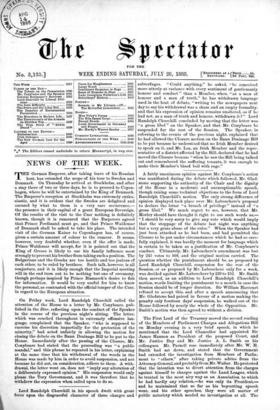A fairly unanimous opinion against Mr. Conybeare's action was manifested
during the debate which followed, Mr. Glad- stone supporting the authority of the Chair and the dignity of the House in a moderate and unexceptionable speech, though raising some technical objections to the form of Lord Randolph Churchill's motion. The only strong difference of opinion displayed took place over Mr. Labouchere's proposal to declare the letter "a breach of privilege" instead of "a gross libel." We much regret to see, however, that Mr. Morley should have thought it right to use such words as,— " I should be very sorry to give any vote which would imply that the stoppage of the debate last night was anything but a very gross abuse of the rules." When the Speaker had just been attacked as he had been, and had permitted this Closure to be put under circumstances which he had so care- fully explained, it was hardly the moment for language which is certain to be taken as a justification of Mr. Conybeare's conduct. Ultimately, Mr. Labouchere's amendment was lost by 245 votes to 168, and the original motion carried. The question whether the punishment should be, as proposed by Lord Randolph Churchill, suspension for the rest of the Session, or as proposed by Mr. Labouchere only for a week, was decided against Mr. Labouchere by 229 to 152. Mr. Smith then moved, as an addition to Lord Randolph Churchill's motion, words limiting the punishment to a month in case the Session should be of longer duration. Sir William Harcourt refused to accept this, and after a speech announcing that Mr. Gladstone had paired in favour of a motion making the penalty only fourteen days' suspension, he walked out of the House followed by nearly the whole of the Opposition. Mr. Smith's motion was then agreed to without a division.


































